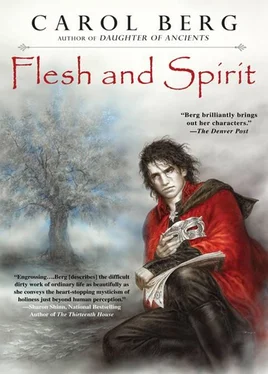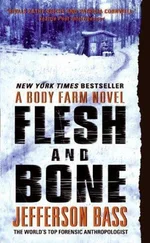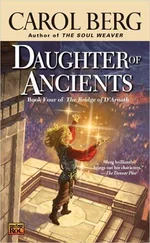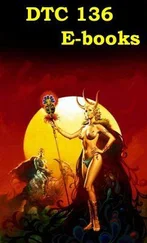They insisted I ride Brother Anselm’s bony donkey back to the abbey. As the monk led the plodding beast along the embankment, I looked out on the flats—still and silent, the horrors of the morning hidden beneath the mantle of fresh snow. My sister walked alongside me, and her gaze followed mine. “What happened out there, Valen?”
I shook my head and shuddered. “Just don’t walk there, Lassa. Don’t ever.”
“When did they strike?” I said.
Brother Anselm, the donkey, and I slogged up the last slight rise between us and Gillarine. I had dismounted the balky ass. Walking eased my stiffness and kept the blood flowing in my hands and feet. Save for the marrow-deep chill and a general weariness, I’d come out of the day’s events astonishingly well. But all relief had fled when the shy assistant infirmarian at last explained Thalassa’s references to “shambles.”
“’Twas on Saint Eldred’s Night, Brother Valen. You were not a fortnight gone from here. Some hundred or more raiders, both Moriangi and Harrowers, come twixt Matins and Lauds. Their fire arrows and torches took the scriptorium first. Then the church. Then the rest.”
“Great Iero’s mercy!” We had reached the top of the little rise, and the sight took my breath. The windows of the abbey church, whose brilliance in sun and candlelight had spoken of angels’ wings, gaped black as hell’s maw; the groins and buttresses mimed the naked ribs of a skeleton. The wooden buildings—infirmary, brewhouse, stables—had vanished, their remains hidden beneath a pall of gray snow. Gillarine Abbey stood broken and dark.
“We were blessed most walls were stone.”
But the slate roofs had fallen when the supporting timbers burned—a pureblood firemaster attached to the Moriangi raiders would have seen to that—smashing at least a third of the inner courts to jagged ruin. Only the gatehouse and walls stood unmarred. The damnable cowards had marched straight through the sanctuary gate to wreak their holocaust.
“What of the brothers, Anselm? By the One God…” So many good men lived here: the kindly, skilled infirmarian, Robierre; garrulous Cadeus the porter; old Nunius, who reveled in holy minutiae…
“Eleven passed to Iero’s heaven on Saint Eldred’s Night, three succumbed to injuries since then, and five more fell to lung fever—Abelard and Nunius, the eldest and weakest of us who breathed too much smoke or bent to the cold. Dear Brother Robierre died saving poor Marcus from the fire. With the ground so hard frozen and neither hands nor time to spare for digging, we’ve had to lay them in the cellars.”
“Ah, Brother…” The physical ruin paled beside such a loss. What words could express sorrow enough? Neither sympathy nor helpless anger could repair this wound or ease the future it boded. The survivors’ trials were only begun. They would yet have more than twenty to feed and clothe. “What of your stores? And, blessed saints, what did they do to the orchard?” The trees still standing looked leprous, not burned, bark hanging in rags, trunks gouged and seeping, branches broken. More than half had fallen, bare roots frosted like nests of white snakes.
“The undercrofts were gutted for the most. Naught burns like spilled oil and dry grain. We’ve a few bales of wool left, though smoked and charred, and Brother Jerome, Iero welcome his cook’s soul, fell to a Morian blade defending his last root cellar. But the orchard now”—the lay brother’s wide face crumpled like an old rag—“that weren’t the soldiers. No man, but only the One God himself sent us that trial. A root rot, Brother Gardener said, that spread through the trees at the same time the murrain come to the sheepfold. It’s the sickness in the world, as Father Abbot so often warned of, come to Gillarine at last…and now we’ve heard tidings of his own passing.”
Anselm’s stolid presence faltered but did not break. His gaitered sandals crunched the snow, and he encouraged the tired donkey with a soft pat and an assertive tug on the lead.
“Prior Nemesio has taken us well in hand. And the good God grants us fortitude. To share the trials of his poorest in this land must surely bring us grace. A blessing we’ve none with your appetite to feed.” He chuckled softly, then sighed. “We could use a cheerful story adventure as you’re wont to tell, though. We rejoice that our brothers live with the saints, and we know that Iero will give us all we need, do we but ask, but truly we feel a dreadful sadness come upon us with this untimely winter.”
Sadness. Yes. More than the failing light and ruined buildings. More than so many good men dead. Gods grant you peace and care, good Robierre, as you gave so many, and Jerome, may you feast at the god’s own table. A pervasive sorrow held the abbey in its grip, a grieving in the stones and earth that felt as if the sun would never relieve this falling night. The thick dry cloak Thalassa had given me felt thin as gossamer.
As Anselm and I led the donkey across the field toward the gatehouse, the shy lay brother continued his stories of the raid and its aftermath. I’d never heard so many words from the infirmarian’s assistant in all the weeks I’d lived at Gillarine. Perhaps trials did bring out new strengths in us.
Behind us, on the road that stretched northward toward Elanus and Palinur, Thalassa, her faithful Silos, and her five temple guards had vanished into the darkening forest, determined to reach Elanus before nightfall. My sister’s parting kiss yet burned on my forehead. A kiss from Thalassa. She must believe I was going to die in Evanore. Unfortunately, I could not ease her concern. What use would the Bastard find for a mind-dead former doulon slave?
“Thank you for rescuing me yet again,” I’d said after she yanked my head down and planted that unexpected kiss. Then I’d stooped to whisper in her ear, “Teneamus.”
I’d never seen her smile like that. Genuine. Pleased. Sad. “Hold on to your soul, little brother,” she’d said as she mounted her palfrey. “Be well.”
“I’d be happy enough with warm, Sinduria serena.”
She’d rolled her eyes and ridden away. I was happy she hadn’t told me whether I would ever see her again.
“I’ll put old Dob to shelter; then we’ll find you a bed and a bite,” said Anselm as we slogged through the gatehouse tunnel. A snarl of thick ropes and harness protruded from the drifted snow, and the wooden gates lay twisted from their hinges. “I needs must ask Father Prior if you’re to be housed in the dorter—which is now moved to the abbot’s house as it’s got a roof—or in the guesthouse. That new lord’s come today is most forbidding, I’ll say.” He nodded at Voushanti’s retreating back. The mardane had hurried off ahead of us to see where Philo and Melkire were bedded down. “Some folk I knew as a lad would call him marked of the Adversary. You’ve not renounced your vows, have you, lad, or been dispensed from them?”
“Just taken on new ones, Brother,” I said, feeling an unexpected heat in my cheeks. “Lord Voushanti is my new master’s proxy.”
We trudged through the Porter’s Gate and into the trampled gardens in front of the dark church. Anselm frowned. “So you’ll to the guesthouse, then. We’ve a fire laid. And you’ll need dry clothes. Secular garb. You take a good rest tonight, and I’ll put a flea in Father Prior’s ear to ask if Lord Stearc might have left some things would come near fitting you. I’ll send a posset as well, to stave off chills and damage from frostbite. Not so excellent as Brother Badger would have made for you, of course.”
Summoning a smile, I clapped him on the shoulder in thanks.
Once left alone, the sad emptiness of the abbey gripped my spirit sorely. Despite the cold, I lingered in the familiar paths and courts. To rush toward fire and food seemed somehow lacking in respect. So, rather than taking the straighter way to the guesthouse, I wandered past the church into the north cloister walk and looked out on the cloister garth—the abbey’s heart.
Читать дальше












